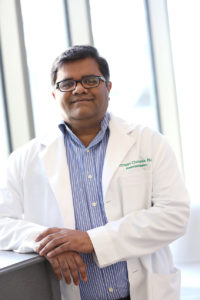HSC offers first-ever Certificate in Pharmacometrics
By Diane Smith
The University of North Texas Health Science Center at Fort Worth is offering students a new specialty certification that will give them a competitive edge in graduate school and the workforce.
The Certificate in Pharmacometrics program, offered by the College of Pharmacy, is touted as a first of its kind. The application process is underway and ends Aug. 3.
Pharmacometrics is defined by the U.S. Food and Drug Administration “as the science that quantifies drug, disease and trial information to aid efficient drug development and/or regulatory decisions,” said Ayyappa Chaturvedula, PhD, FCP, Associate Professor of Pharmacotherapy at the College of Pharmacy.
“We are excited that this is the first certificate program of its kind in the nation and also in our college,” he said. “Particularly, we are thrilled by the fact that our PharmD students and others at HSC can finish the program in parallel to their professional studies and enhance their career opportunities in drug development.”
Dr. Chaturvedula said pharmacometrics is an emerging science that will help “determine optimal dosing of medications that provides the maximum therapeutic benefits with minimum side effects.”
The College of Pharmacy is hosting a virtual Pharmacometrics Symposium on July 10. The event will delve into the role of pharmacometrics in drug development, career opportunities and the new certification program offered at HSC.
“For any program, the caliber of the teaching faculty is critical for its student learning and success,” said Dr. Suresh Madhavan, Dean of the College of Pharmacy. “Dr. Chaturvedula is an outstanding researcher and educator himself and has assembled a real ‘who’s who’ of the pharmacometrics world in Drs. Ene Ette, Michael Fossler, Navin Goyal and Mark Sale, a team of experts who will bring different experiences and perspectives to the learning process.”
Pharmacometrics symposium (virtual)When: July 10, 10-11:30 AM CST Overview of the Symposium: The symposium is designed to describe the role of pharmacometrics in drug development from the experts. The discussion will also focus on the career opportunities for the health science graduates within clinical pharmacology/pharmacometrics and describe the new certificate program in pharmacometrics (online) at the HSC. Presenters:
|
The courses are online, based on case studies and include interactive discussions. The 15-credit program can be completed over an academic year, including fall, spring and summer semesters.
Students will have the flexibility to build their own course schedules – an important aspect of the program.
Dr. Chaturvedula said anyone with a bachelor’s degree is encouraged to apply. Students may need to take pre-requisite courses in statistics, pharmacokinetics, and anatomy and physiology.
“Oftentimes, pharmacometricians come from various basic educational backgrounds such as pharmacy, medicine, pharmacology, toxicology, other health science disciplines and engineering, such as biomedical or chemical,” he said. “They pursue careers in clinical pharmacology in academia, clinical research organizations, pharmaceutical companies and in hospitals.”
Dr. Chaturvedula said the course modules are designed to build required skills in sequential, manageable units for students already pursuing other degrees or working at jobs.
Weekly assignments will help build skills step-by-step. Each course requires about three to four hours of time commitment per week, he said.
The certificate program is designed to build strong foundational skills in pharmacometrics.
Dr. Chaturvedula said that for students who seek to pursue a clinical pharmacology-related career, this certificate program will qualify them for advanced degrees or fellowships in the field, and entry-level positions in the pharmaceutical industry and regulatory agencies.
Pharmacists, medical doctors and physician assistants will develop skills in Bayesian dosing and further enhance clinical practice and research opportunities, he said.
“Students who earn a certificate with us will become excellent candidates for these graduate programs in the future should they decide to delve deeper in this field,” he said.





Social media